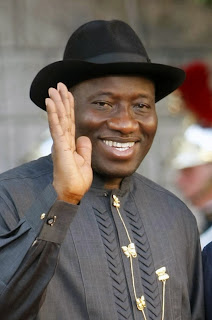His transition hours by Wole Olaoye
Goodluck Jonathan’s greatest call to enduring fame is the fact that he was the first Nigerian to ever concede victory to his opponent in a major federal election. Before his now historic concession – and even since then – the tradition has been for a loser to proceed to the election tribunal and do everything to tarnish the legitimacy of his successor. Jonathan behaved nobly by conceding to Buhari. Nothing can snatch that trophy from him.
I rather enjoyed the former president’s narration of the historic moment in his recently launched book, My Transition Hours.
“I reached for the telephone and placed a call through the State House operators at about 4:45 pm. A peace I had never felt since my political sojourn, descended on me. It showed me where I had been in the past 16 years and where I was then. I smiled at the thought of what I was about to do.
“I waited calmly for the person at the other end of my call to answer.
Buhari: “Hello Your Excellency!”
Me: “Your Excellency, how are you?”
Buhari: “I am all right, Your Excellency”
Me: “Congratulations!”
Buhari: “Thank you very much Your Excellency …”
“For several seconds the line was seized by the loudest silence I have ever known. Then we had a brief discussion. I could sense his relief too. He knew what could have been. Here is a man who had contested three times and lost. Maybe my gesture humbled him against his expectations because he thanked me and we talked about the handing over processes.”
Jonathan’s book shows how transient power can be, and how acolytes who feed from the altar of power would readily encourage their principal to set the country on fire so that they could still have a seat in the blazing gravy train. Since several of his former ministers have either openly or covertly disowned part of Jonathan’s narrative, we look forward to their own accounts if and when they decide to write. However, we know that in these climes, people would rather die than lose the privileges that come with power.
Incumbent President Buhari was therefore not flattering his predecessor in his address read at the book launch when he declared, “I want to openly as I have done on several occasions salute the statesmanship, sportsmanship and courage embodied in the person of Dr. Goodluck Ebele Jonathan … Your Excellency, your singular act of placing a call to me doused and calmed frayed nerves all over the country and I sincerely thank you for being a true democrat and a patriotic Nigerian … History has recorded your time as Nigerian’s fifth democratically elected leader since independence. History will judge you well as a patriotic leader.”
Former Head of State, General Yakubu Gowon also recalled that he was at the African Union Congress in 2015 during those feisty hours and that there were serious concerns about Nigeria’s elections. When the news was of Jonathan’s concession broke, everyone erupted in jubilation. “Jonathan did something: he saved Nigeria’s democracy because he never wanted anybody to die”, said Gowon.
Jonathan’s My Transition Hours, commends itself to all those who have had the privilege of holding positions of trust in the Nigerian political space. Let’s have more books, warts and all. The more the better for our political compass. Given our politicians’ penchant for having various Revised Standard Versions of Truth, we have many more books to go. Imagine, 48 years after the end of the Nigerian Civil War, we still don’t have a comprehensive, objective and generally acceptable account of that tragedy.
Having said that, I’m wearied by the spectre of alleged inexactitudes.
As is usual with our attempt to recall past events and record same for posterity, we can’t seem to agree on who said what and who did what when it mattered most. Jonathan’s account runs counter to recollections by his Minster of Finance and Coordinating Minister of the Economy, Ngozi Okonjo Iweala. His Justice Minister, Mohammed Adoke who has been operating from abroad is also reportedly unhappy that he was cast in the garb of lackeys who wanted the former president to cling to power.
Okonjo-Iweala, a player on the global stage, has rendered her own account. The jury is still out on her role and those of other major players in the Nigerian drama of 2015. Bolaji Abdullahi’s account in “On a Platter of Gold” is slightly different. He said Jonathan had rejected suggestions that he concede to Buhari and that it was presidential aide Waripamo-Owei Dudafa who saved the day. All told, the final decision to concede was Jonathan’s and his alone.
I think Jonathan is a good man – as good as most of his countrymen and women. But he was a seriously flawed leader. Most times in Nigeria, we have good men in positions of authority whose character flaws are exploited by fawning nonentities who see him as their meal ticket, and use their closeness to pillage the country.
It has happened time and time again – which lends credence to the contention of one of my favourite public intellectuals, Bishop Matthew Hassan Kukah: The set of qualities required of a man who wants to be a priest is not the same as someone who wants to be a president. What Nigeria needs is not a messiah but men with conscience and political will. There is a distinction between holding office and being a leader. Good governance is not about good men, good women or bad men, bad women.


Comments
Post a Comment